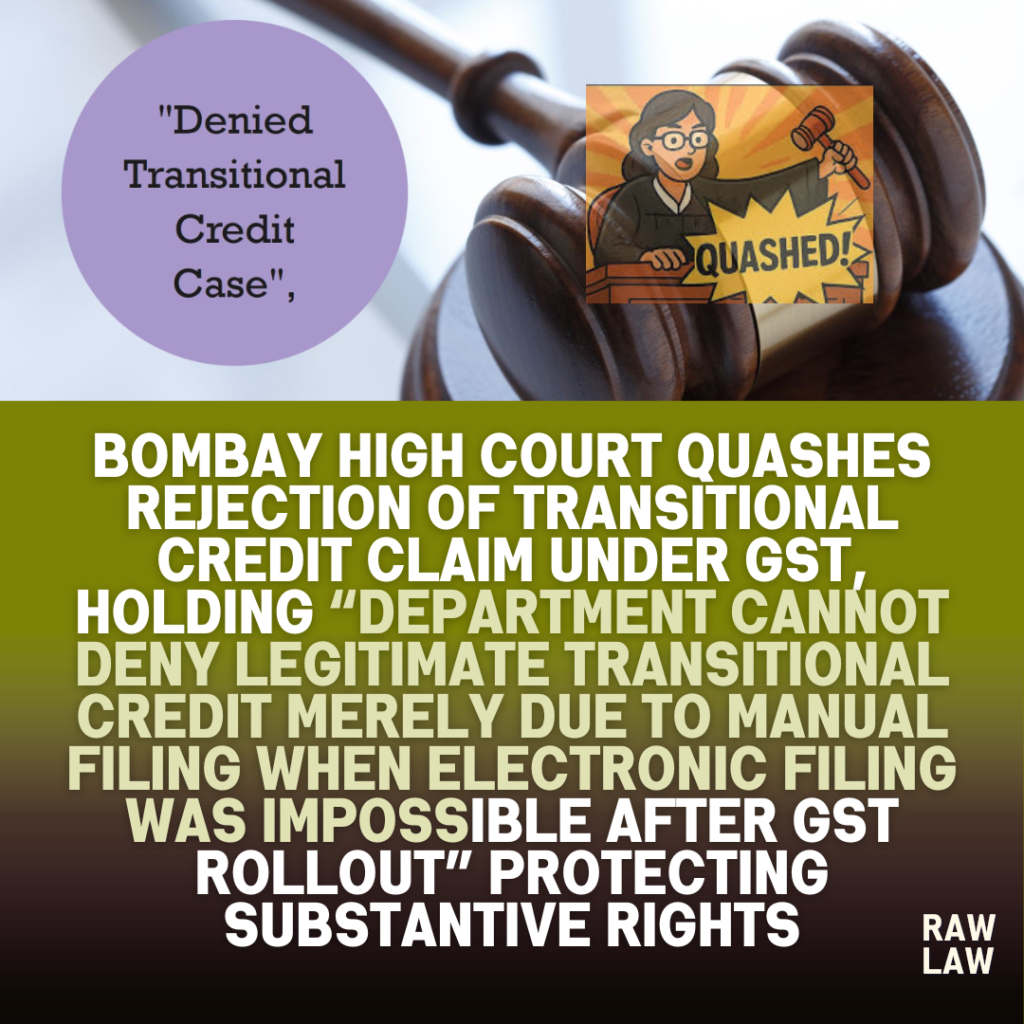Court’s Decision
The Bombay High Court allowed the writ petition, quashed the rejection order dated 27 February 2023, and directed the GST authorities to accept the petitioner’s manually filed revised excise return and permit the transition of CENVAT credit of Rs. 1,16,29,351 under GST. The Court held that substantive rights cannot be denied due to procedural limitations where electronic filing was impossible post-GST implementation.
Facts
The petitioner, engaged in manufacturing industrial catalysts, filed GST TRAN-1 in August 2017 transitioning Rs. 4.31 crores as CENVAT credit but later realised it had inadvertently missed claiming Rs. 1.16 crores related to three Bills of Entry from May/June 2017. The petitioner informed the authorities within one year in February 2018. After the Supreme Court in Filco Trade Centre allowed revision of TRAN-1 due to technical glitches, the petitioner filed a manual revised excise return in November 2022 and revised TRAN-1 accordingly. The GST department rejected the claim citing the inability to revise excise returns electronically post the cutoff date.
Issues
Whether transitional credit under GST can be denied solely on the ground that revised excise returns were filed manually, not electronically, when electronic portals were unavailable post-GST implementation.
Whether substantive transitional credit rights under Section 140 of the CGST Act can be denied due to procedural limitations in transitioning from the pre-GST to the GST regime.
Petitioner’s Arguments
The petitioner argued that post-July 2017, electronic revision of excise returns was impossible as the old portal was non-functional, and manual filing was the only available method. They highlighted that the claim was raised within one year and that the Supreme Court’s order in Filco Trade Centre enabled them to revise TRAN-1. They asserted that denying transitional credit due to the method of filing, despite there being no revenue loss, was unjust and violated their substantive rights.
Respondent’s Arguments
The GST department argued that as per the 2010 notification, revised excise returns had to be filed electronically and manual filing was not permissible. It contended that the rejection was justified due to the procedural lapse, regardless of substantive entitlement, and sought dismissal of the petition.
Analysis of the Law
The Court analysed:
- Section 140 of the CGST Act, 2017 regarding transitional provisions.
- The Supreme Court’s ruling in Filco Trade Centre enabling the revision of TRAN-1 due to technical issues.
- The principle that procedural limitations cannot override substantive rights when portals were unavailable.
- Rule 4 of the CENVAT Credit Rules, 2004 regarding time limits, and its application considering the factual timeline and the transitional framework.
Precedent Analysis
- Filco Trade Centre Pvt Ltd: Supreme Court permitted revision of TRAN-1 where technical issues prevented electronic filing.
- Aberdare Technologies Pvt Ltd (Bombay HC and affirmed by SC): Held substantive transitional credit rights cannot be denied for procedural reasons if no revenue loss occurred.
- Jekson Vision Pvt Ltd (Gujarat HC): Allowed transitional credit where manual returns were filed due to technical non-availability of the portal.
These cases collectively established that rights under GST transitional provisions cannot be defeated by procedural limitations in exceptional circumstances.
Court’s Reasoning
The Court held that the petitioner’s claim could not be rejected solely on the ground that the revised excise returns were manually filed when electronic filing was impossible post-GST implementation. The petitioner had informed the authorities within one year and revised TRAN-1 within the extended timeline provided by the Supreme Court in Filco Trade Centre. Since there was no dispute regarding the petitioner’s eligibility and no revenue loss, denying the claim would defeat substantive rights due to mere procedural limitations.
The Court stated: “It would amount to calling upon the petitioner to do something which was not possible electronically post 1 July 2017.”
Conclusion
The High Court:
- Quashed the order rejecting the transitional credit claim.
- Directed the GST authorities to accept the petitioner’s manually filed revised excise return and permit the transition of Rs. 1,16,29,351 under GST within eight weeks.
- Clarified that substantive rights cannot be denied due to procedural limitations where the system itself prevented compliance.
Implications
This judgment:
- Safeguards the rights of taxpayers transitioning to GST where technical or systemic limitations hindered procedural compliance.
- Clarifies that the GST regime should not deny transitional credits when the eligibility is not in dispute, and there is no revenue loss.
- Strengthens judicial oversight in ensuring fairness during the transition from the pre-GST to GST regime.
Short Notes on Referred Cases
- Filco Trade Centre Pvt Ltd: SC allowed revision of TRAN-1 where technical glitches hindered filing.
- Aberdare Technologies Pvt Ltd: Held that procedural lapses cannot defeat substantive rights under GST.
- Jekson Vision Pvt Ltd: Transitional credit cannot be denied where manual returns were filed due to portal issues.
These were cited to support that transitional rights must be protected if procedural compliance was impossible due to systemic constraints.
FAQs
1. Can GST authorities deny transitional credit due to manual filing of revised excise returns?
No, if electronic filing was impossible, manual filing suffices, and transitional credits should not be denied.
2. What did the court say about procedural compliance post-GST implementation?
Procedural limitations cannot defeat substantive rights when electronic filing was unavailable.
3. How long do GST authorities have to process this claim now?
They must process and allow the claim within eight weeks from the order’s upload date.
